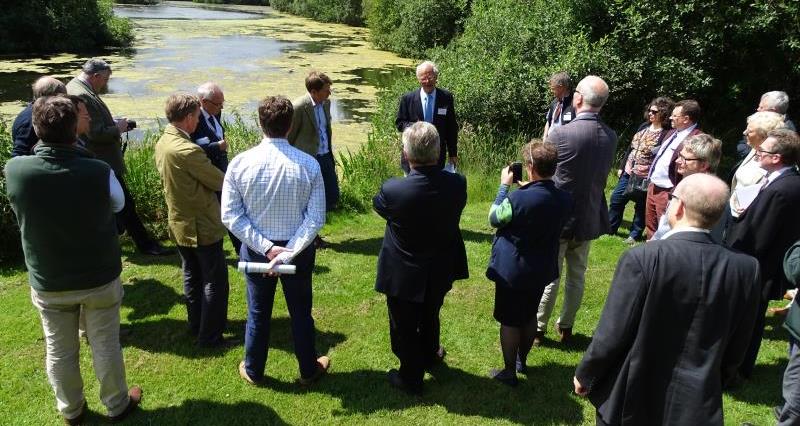In brief...........
An irrigation event in Suffolk, where access to water has transformed local food production, has explored future abstraction challenges and how to meet them.
Food and farming leaders joined MPs and councillors for a one day conference to highlight the importance of reliable water sources to irrigated crops grown in East Suffolk
An event hosted by the East Suffolk Water Abstractors Group (ESWAG), supported by the Suffolk Agricultural Association has identified water as the essential ingredient for local food production and discussed with representatives of local and national government ways in which farmers can secure a ‘fair share’ of the water they need.
The event was hosted by Wantisden Hall Farm and included presentations and a farm tour, as well as the chance for discussion and debate around this key issue.
The aim was to demonstrate the importance of a reliable source of water for irrigating crops grown in Suffolk and examine how this impacts on a key sector for the regional economy and a source of food production for the country as a whole.
It also served to highlight issues around water abstraction licences and the steps farmers are taking in the region towards responsible water usage and environmental protection.
A 2010 survey by ESWAG estimated the value of output in coastal Suffolk at £32 million, including 121,000 tonnes of potatoes, 90,500 tonnes of carrots and 54,400 tonnes of onions.
Tim Darby, manager of ESWAG, said: “With the reliance of agricultural and horticultural production in East Suffolk on a secure supply of water, we need to make sure that the key decision and policy makers are aware of our unique situation.”
The importance of water to local farmers was highlighted by Doug Inglis, a company director of Velcourt Farming based in Woodbridge. He described the role irrigated crops play at Greenwell Farms, contributing £4.21 million of the £5.26 million business turnover.
“Irrigation is absolutely fundamental. We have to achieve the right yields and also the right quality. As anyone who deals with supermarkets will tell you, they are motivated by quality,” he said.
NFU national water resources specialist Paul Hammett praised the conference organisers for the theme they had chosen – Water: farming’s essential ingredient.
“Let’s be clear. Water for food is a really big deal in Suffolk and its neighbouring counties,” he said.
“Lincolnshire, Cambridgeshire, Norfolk and Suffolk are responsible for 34 per cent of the nation’s output of fresh produce - £1.1 billion in value. If you consider that the value of our national wheat crop is £1.9 billion that puts things into perspective. That irrigated crop sector also contributes to the significant food manufacturing and processing sector around us in East Anglia.”
Paul Hammett said that the two key risks to farm businesses were labour availability and water security.
He said that the challenge of how to allocate limited volumes of water between the environment, public need, energy, industry and agriculture lay at the heart of the Government’s abstraction reform proposals.
Government’s proposals for abstraction reform advocate that we move away from a ‘first come, first served’ system of water allocation to a process that lets the market decide.
“In other words, the regulatory system becomes flexible enough to allow water to be traded between different parties, and so the available water is consumed where it is of highest value,” said Mr Hammett.
“It’s a reasonable theory and the NFU agrees that the current regulatory system is unlikely to cope with future pressures and so should be changed. Nevertheless, abstraction reform will have a potentially massive impact on individual growers and the whole fresh produce sector.
“Accepting change will require an enormous leap of faith from the farming community and, as ever, the devil will be in the detail.”
He said it was vital that the reforms recognised and accommodated farming’s variable need for water depending on the season and weather conditions.
A second key issue was ensuring water for food was given greater priority when restrictions were imposed during dry and drought conditions.
“We think that water for food production should move up the allocation league table. We cannot go on relying on other countries, which are much more water stressed than the UK, to bail us out in a drought emergency by providing us with their food,” he said.
